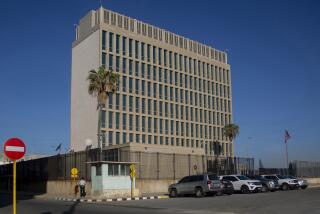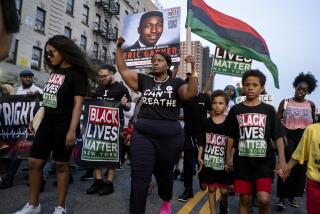Soldiers’ ills blamed on stress, not concussion
- Share via
Post-traumatic stress, and not brain injury, is responsible for many of the symptoms reported by U.S. soldiers who suffered concussions in Iraq, according to research released Wednesday.
The report in the New England Journal of Medicine was the first to look at the longer-term effects of mild traumatic brain injury, considered the signature injury of the war.
The study, conducted by the Walter Reed Army Institute of Research, found that 44% of soldiers who had reported losing consciousness -- commonly as the result of a bomb blast -- also had post-traumatic stress disorder. Many of the symptoms reported by the soldiers, such as sleep disturbances, memory loss and irritability, appeared related to PTSD and not to brain injury, researchers said. Headache was the only symptom specifically linked to brain injury.
Although traumatic brain injury and PTSD are serious conditions, the results may offer encouragement to the thousands of soldiers who have suffered concussions in Iraq. PTSD is a treatable condition, but there are no treatments for mild traumatic brain injury.
The study was based on surveys of 2,525 soldiers from two brigades that had seen high levels of action during a yearlong deployment in Iraq. The surveys were conducted three to four months after soldiers returned home.
Fifteen percent of soldiers said they experienced a mild brain injury, either being knocked unconscious or becoming momentarily dazed or confused, and 17% of soldiers reported minor non-head injuries during deployment, such as being hurt in a fall.
Soldiers with non-head injuries reported fewer symptoms. About 16% of them met the criteria for post-traumatic stress. Researchers did not know why concussions were associated with an increased risk of PTSD.
Richard A. Bryant, a psychologist at the University of New South Wales in Australia, said in an editorial accompanying the study that mild brain trauma might have damaged the brain circuits that regulate fear and anxiety, leaving victims less able to control their distress.
Dr. Charles W. Hoge of Walter Reed, the lead study author, said it was more likely that the life-threatening nature of the blast -- and not the concussion -- triggered PTSD. He said that football players and boxers suffered concussions without developing post-traumatic stress.
David A. Hovda, director of the Brain Injury Research Center at UCLA, said the survey, which relied on soldiers to report their symptoms, probably underestimated the prevalence of brain injuries. The study could not rule out long-term effects of brain injury, such as a higher risk of Alzheimer’s disease, which become manifest years later, he said. “Those are question marks,” he said.
--






